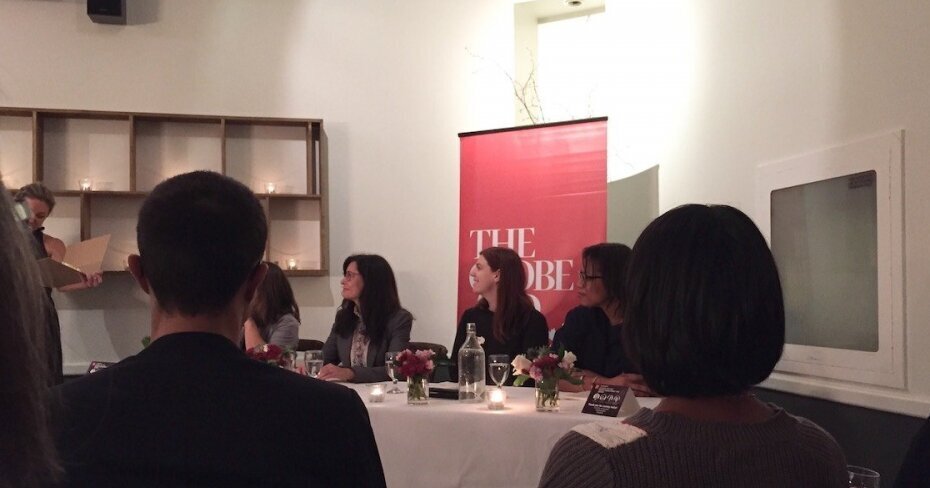‘Women let fear stop them’ and other takeaways from the Globe’s women and money panel
By: Lisa Coxon on November 2, 2018
I have a confession to make: I’ve never met with a financial planner before. And, as a 28-year-old woman who still has three forms of debt to pay off, and a newly minted personal finance writer, this has begun to feel especially irresponsible of me. So, when I saw that the Globe and Mail was hosting an event on Thursday night called “Closing the Gap: Women and Money Management” with three financial experts — all women, to boot — I was intrigued. I’m not yet ready to invest but I want to take my own financial future more seriously. I wasn’t sure what to expect from the panelists. I figured I would hear some sage advice but that the concepts might be over my head. I was wrong.
There, in front of me, were three fiercely intelligent women, each displaying an air of approachability that made me go, Huh. Why haven’t I made an appointment yet? The Globe’s personal finance editor, Roma Luciw, moderated the panel, which consisted of financial planners Rona Birenbaum, Shannon Lee Simmons, and Jackie Porter.
Each answered questions around home buying, investing, the financial challenges of becoming widowed, and how to get your kids to care about money. Here, a few nuggets of wisdom from the night.
Family and finance should go hand in hand
At some point, said Luciw, 90% of women will become the sole financial decision makers of the home. It’s crucial, then, that women aren’t left in the dark about the family’s finances. This is something, sadly, that Birenbaum sees all too often with widowed women. She recommends women and men ask themselves what the worst-case scenario would be, and then make a plan accordingly with their spouse while they’re both still alive. “Do the fire drill,” she said.
If you have kids, involve them, too. Porter advocates for engaging in “money conversations” and family meetings around money with your family. One audience member, a single mother, asked how she could get her 20-year-old son to care about money and his stake in her will. Would it make sense to bring him to one of her meetings with her financial planner? Absolutely. Kids should be engaged in the will while you’re still alive, said Porter, so it’s not all a shock after you go.
With more and more adult children living at home due to exorbitant renting costs and an impenetrable housing market, Simmons said it’s even more crucial for parents to make children aware of their financial situation so that they don’t wind up blowing their savings on helping their kids financially. Think of the instructional announcement on airplanes, Simmons said: put your own oxygen mask on first before helping someone else with theirs.
When it comes to investing, women let fear stop them
This one struck a chord with a lot of women in the audience. Porter said that women tend to let money languish in a savings account out of fear that they’ll make the wrong decision when it comes to investing it. But, she added, women can’t afford to just let their money sit there.
Men, on the other hand, tend to be overconfident about their investment decisions, and are only focused on their short-term returns, whereas women like to understand what their returns will mean for them in the long term. For instance, will they have enough money in 20 years to care for their aging parents?
In order to get those questions answered, women need to feel comfortable enough to say, “Hey, I don’t understand this. Can you explain it to me again?” Before Birenbaum starts helping her clients invest, she has them explain to her what a stock is, what a bond is, and so forth. If they can’t define those terms, “then we have a little learning to do,” she said. The responsibility to inform is a two-way street, too. “Don’t wait for the industry to give you an invitation to take care of yourself,” Birenbaum said. “It’s your personal responsibility to ask questions.”
Child-rearing years set women back in more ways than one
Simmons finds that everyone plans financially for the first child, but not the second one. With couples who have two children, she often hears this from mothers who are returning to work from their second mat leave: “It’s as though I’m working for free, because all of my extra money just goes to daycare.” This, she says, is a tricky line of thinking to fall into, because it can deter women from returning to work at all.
If you don't like your job or don't want to return to the workforce, Simmons said, that’s a different story. But if you do, then it’s best to think long-term. Those kids that are currently in daycare eating up all your money will eventually go to school. And it can be expected that your salary will also increase over the next few years, so while it can feel like all your money is being drained by this additional expense, you’re on an upward trajectory, even if it doesn’t feel like it, and things will rebalance.
Still ringing in my ears, though, is something Simmons said that sent the audience into a fit of laughter. “You should be stoked to see your financial planner every year,” she said. In other words, financial planning should excite, not intimidate you. After last night, I can say it does.


